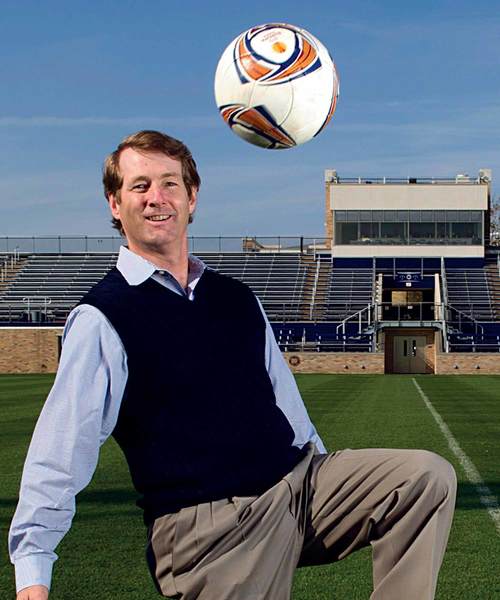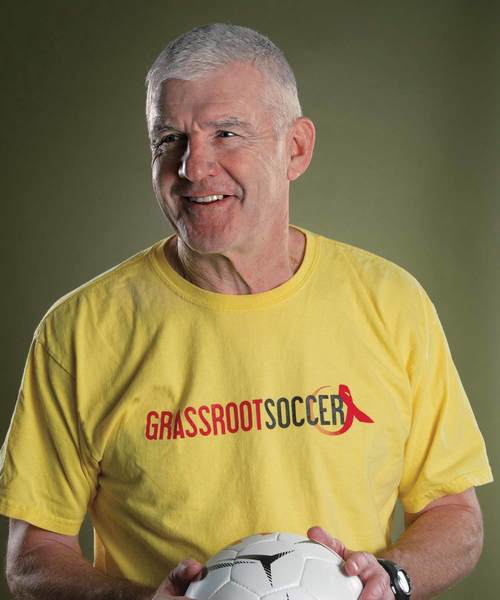
Tom Crotty
Taking the ‘Grassroot’ approach
Without the clever penning of Grantland Rice, Notre Dame’s Four Horsemen might’ve ridden quietly into the sunset, sadly unknown by generations of Irish fans.
Football could have remained a strictly ground-oriented game had Knute Rockne not baffled an unsuspecting Army squad with the seldom-used forward pass.
Even the hard-nosed teams of the Lou Holtz era might have lacked the big-picture mentality needed to win the critical game had the stalwart coach not hung the fabled “Play Like A Champion Today” sign above the locker room steps.
Whether it involves Notre Dame football or not, there’s no question that any novel idea, influential organization or successful team requires a tipping point to catch fire and incite change.
Utilizing the power of sport to educate is certainly not a novel idea, but taking a game like soccer—the world’s version of football—and applying it to cure a global pandemic represents a step into bold new territory.
For Grassroot Soccer—a humanitarian organization that utilizes soccer as a teaching tool to eliminate the spread of HIV and AIDS in sub-Saharan Africa—the curriculum and manpower were there to start an information revolution on the disease-ridden continent.
It just needed a tipping point to become the educational force it is today.
That tipping point was Tom Crotty.
A 1980 University of Notre Dame graduate, Crotty is a gifted venture capitalist—a business-savvy consultant who has taken a promising young charitable group and transformed it into a global leader in the fight against AIDS.
In the six years since Crotty joined the organization, Grassroot has increased its operating budget from $1.5 million to $7.5 million, developed a seamless governance structure and gained the support of influential leaders and corporations including Nike, Bill Gates and Michelle Obama.
As a result, more than 430,000 youth worldwide have graduated from Grassroot’s HIV prevention programs, and the organization is well positioned to increase this number exponentially in the coming years.
“The kind of growth that Grassroot Soccer has experienced is extraordinary in the nonprofit world,” Crotty says.
“The direct correlation of that is the number of kids we’re reaching is skyrocketing.
Knowing that we’re having an impact on these individuals and potentially saving hundreds of thousands of lives, it’s very rewarding.”
Crotty’s involvement with Grassroot Soccer is closely connected to his identity with Notre Dame.
A three-time monogram winner, Crotty’s time at Notre Dame provided him with an invaluable number of life lessons. The Darien, Conn., native played on the first varsity soccer squad under head coach Rich Hunter in 1977, and his time as a founding member of the program, coupled with a degree in finance, offered a number of academic and practical lessons about how to build an organization from the ground up.
Crotty also gained an appreciation of the Holy Cross mission’s service component during his time under the Golden Dome.
“Notre Dame taught me that life is about more than just yourself,” Crotty says.
“It’s about your contribution to society as well. Giving back is just a part of the ethos of the University, and those teachings played a key role in my development and still do 35 years later.”
After Bobby Clark took the reins of the Irish men’s soccer program in 2001, the two-time BIG EAST Coach of the Year made a concerted effort to reach out to the program’s alumni and involve them more with the current team.
Crotty was one of the first alums to connect with Clark, and the two quickly struck up a friendship. As the relationship developed, Clark introduced Crotty to his son, Tommy, who played for his father at Dartmouth from 1988 to 1991.
Tommy Clark had remained in Hanover, N.H., since his playing days and, in addition to his work as a practicing pediatrician, spent most free nights and weekends attempting to raise awareness about his organization, Grassroot Soccer.
The concept of using soccer to prevent the spread of HIV intrigued Crotty, and Clark was in desperate need of some structure and guidance to propel his foundation to the next level.
A geographic match made in heaven, Clark would often stop in the Boston area to see Crotty before boarding a plane at Logan Airport to visit various destinations across the African continent.
“I think the first thing Tom said to me was that I needed a business plan and I needed a chief operating officer,” Clark says.
“Pretty basic stuff, but it was news to me at the time. With his knowledge of business growth patterns and his ability to apply this knowledge to a nonprofit organization, he’s just an incredible fit for our team.”
After a few of their strategic meetings, Clark knew he needed Crotty as a member of his board of directors. Crotty was thrilled, and immediately began analyzing the corporate structure of Grassroot Soccer to streamline operations and put the pieces in place to create sustainable, long-term growth.
Crotty became an active advisor to the organization’s management team. He took the lead in developing rigorous hiring measures and structured a clear set of metrics, ensuring there was an elite staff in place and a proper method to measure the effectiveness of Grassroot’s curriculum.
“Without Tom, it would have been very hard for us to get where we are today—maybe impossible,” Clark says.
“His experience and his infusion of energy and enthusiasm at that time was just critical.”
Crotty continued to play a key role in the organization’s development over the next few years and in 2009, Clark appointed Crotty chairman of the board.
In addition to his organizational oversight duties as chairman, Crotty assists with the fundraising branch of Grassroot Soccer. In that role, he identifies prospective donors, sets up meetings to discover their core passions and recruits them to get involved.
“I get the biggest kick out of taking potential donors to Africa,” Crotty says.
“If we can get these individuals on the ground to see the Grassroot team in action, it’s guaranteed they’re going to be passionate supporters. Seeing the positive impact we have in the townships and villages—in addition to the passion and energy of our staff—it sucks people in. It’s just great stuff.”
Crotty is a passionate believer in the power of the Grassroot curriculum and speaks ardently about the methods used to educate the 12- to 20-year-old African teenagers the program targets.
“The best way to get young people’s attention is to get them comfortable with a social issue that has a lot of stigma and fear related to it, then use soccer as a learning tool to convey the subject matter,” Crotty says.
“The kids gravitate to it. If you put a ball out, they all come running.”
Grassroot has developed a suite of soccer drills that combines information about AIDS and HIV with physical activities. In one module, kids dribble through cones and each time the ball touches a cone, they have to read a fact or lesson about how poor decisions—such as consuming alcohol—can lead to the spread of HIV.
“Essentially, what you’re trying to reinforce is that there are ramifications if you do one of these inappropriate activities,” Crotty says.
“There are morals and lessons to be learned from each exercise.”
While Crotty is an elite business leader and a powerful force in the board room, he’s also a consummate family man. His wife, Shari, daughter, Paige, and son, Sean, have accompanied him on trips to South Africa, Zambia and Tanzania, and are active members of the Grassroot team.
“It’s been a tremendous family venture and educational process for us to get involved in Africa,” Crotty says.
“We love traveling there and being on the ground to watch what’s going on firsthand and participate.”
Crotty got a particular kick out of one trip, when he and Sean were enlisted to role play in a skit about peer pressure. Crotty played an easily influenced teen, and couldn’t help but chuckle as 15-year-old Sean and other South African teens started harassing him to go along with the crowd and make bad life decisions.
It was a moment where he just had to stop and think about how Grassroot has provided a tremendous opportunity to bring his family together.
The importance of families is a key aspect of the Grassroot Soccer mentality. Many of the coaches and staff members in Africa, including a number of professional soccer players, have been personally affected by the disease.
“Most of our coaches have lost family members to AIDS,” Crotty says.
“Sitting down and talking with them about what brought them to Grassroot, what motivates them and how they’re inspired to teach because of their loss is a humbling experience. It’s incredible affecting.”
In addition to this talented staff, the organization employs a number of interns each year to assist on the ground in Africa, and Crotty returns to Notre Dame every season to recruit potential Grassroot ambassadors from Bobby Clark’s roster.
Crotty remains an active contributor to the soccer program since first meeting Clark in 2001, and served as a lead benefactor in the development and construction of Alumni Stadium in 2008. Each year, the men’s soccer program donates all ticket sales from a key game to Grassroot Soccer, and Crotty pledges his support by matching the total.
It is a testament to how much he believes in the power of what Grassroot can do, and his vision for the organization’s future is a unique one.
Grassroot Soccer hopes to graduate one million children from the program by the 2014 World Cup and continue to grow from there.
While Crotty provided the tipping point for Grassroot back in 2006, he believes the ultimate goal for the organization is having the privilege to cease operations altogether.
“To put ourselves out of business would be a great success,” Crotty says.
“In that scenario, HIV is no longer a major epidemic in our world, and we can shut our doors and move on to do something else.
“That end game would be just fine. It’s a win for everybody.”

